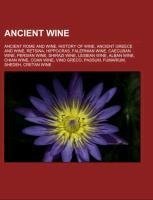
-
 Anglický jazyk
Anglický jazyk
Ancient wine
Autor: Source: Wikipedia
Source: Wikipedia. Pages: 28. Chapters: Ancient Rome and wine, History of wine, Ancient Greece and wine, Retsina, Hippocras, Falernian wine, Caecuban wine, Persian wine, Shirazi wine, Lesbian wine, Alban wine, Chian wine, Coan wine, Vino Greco, Passum, Fumarium,... Viac o knihe
Na objednávku
12.94 €
bežná cena: 14.70 €
O knihe
Source: Wikipedia. Pages: 28. Chapters: Ancient Rome and wine, History of wine, Ancient Greece and wine, Retsina, Hippocras, Falernian wine, Caecuban wine, Persian wine, Shirazi wine, Lesbian wine, Alban wine, Chian wine, Coan wine, Vino Greco, Passum, Fumarium, Shedeh, Cretan wine, Conditum Paradoxum. Excerpt: Ancient Rome played a pivotal role in the history of wine. The earliest influences of viticulture on the Italian peninsula can be traced to Ancient Greeks and Etruscans. The rise of the Roman Empire saw an increase in technology and awareness of winemaking which spread to all parts of the empire. The influence of the Romans has had a profound effect of the histories of today's major winemaking regions of France, Germany, Italy, Portugal and Spain. In the hands of the Romans, wine became "democratic" and available to all, from the lowly slave to the simple peasant to the aristocrat. The Romans' belief that wine was a daily necessity of life promoted its widespread availability among all classes. This led to the desire to spread viticulture and wine production to every part of the Roman empire, to ensure steady supplies for Roman soldiers and colonists. Economics also came into play, as Roman merchants saw opportunities for trade with native tribes such as those from Gaul and Germania, bringing Roman influences to these regions before the arrival of the Roman military . The works of Roman writers-most notably Cato, Columella, Horace, Palladius, Pliny, Varro and Virgil-give insights on the role of wine in Roman culture and contemporary understanding of winemaking and viticultural practices. Many of the techniques and principles first developed in Roman times can be found in modern winemaking. Ancient Roman statue of Dionysus (also known as Bacchus), god of wine (c. 150 AD, Prado, Madrid). The ruins of Carthage. When the city was destroyed, one of the few items that the Romans saved was the agricultural works of Mago.Wild grapevines have grown on the Italian peninsula since prehistory and historians have not been able to pinpoint the exact moment in time when domestic viticulture and winemaking first occurred. It is possible that the Mycenaean had some influences with early Greek settlements in southern Italy but the earliest recorded evidence of Greek influence was in
- Vydavateľstvo: Books LLC, Reference Series
- Rok vydania: 2012
- Formát: Paperback
- Rozmer: 246 x 189 mm
- Jazyk: Anglický jazyk
- ISBN: 9781155421377






 Ruský jazyk
Ruský jazyk 





